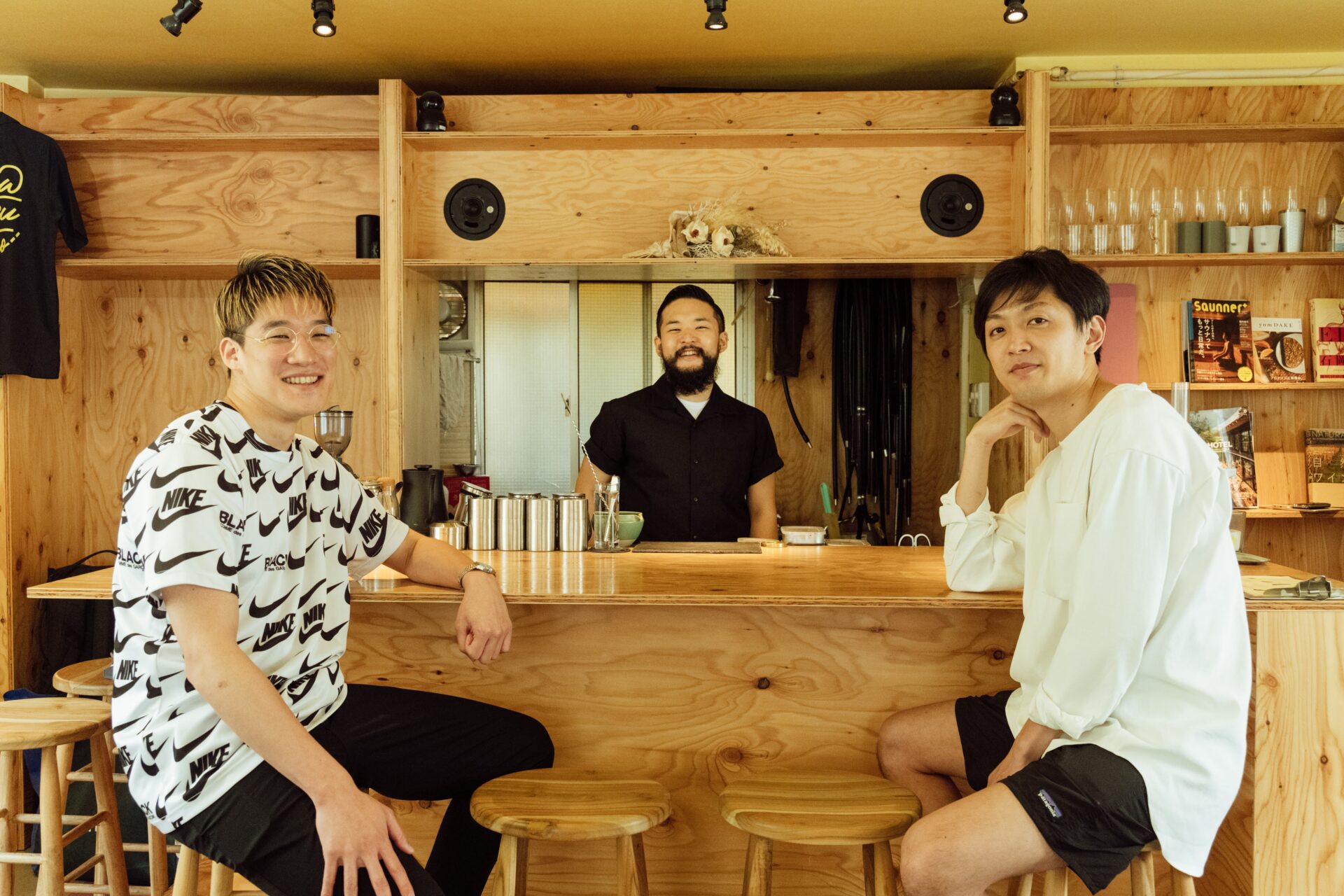Your notifications pile up, one after another. Your timeline sluggishly updates itself.
The seasons and colors of the trees along the streets change before you have a chance to experience their sensations.
The frustration of feeling rushed through life.
In the midst of it all, we seek to find moments to take a breath and slow down.
In this special series, “Positive Scenes for Escape,” we focus on products, events, and people who melt the hectic pace of life to create positive moments in our everyday lives.
This article welcomes Jo Ishikawa and photographer ENO SHOHKI from Yellow, a shisha cafe in Ebisu identifiable by its yellow building.
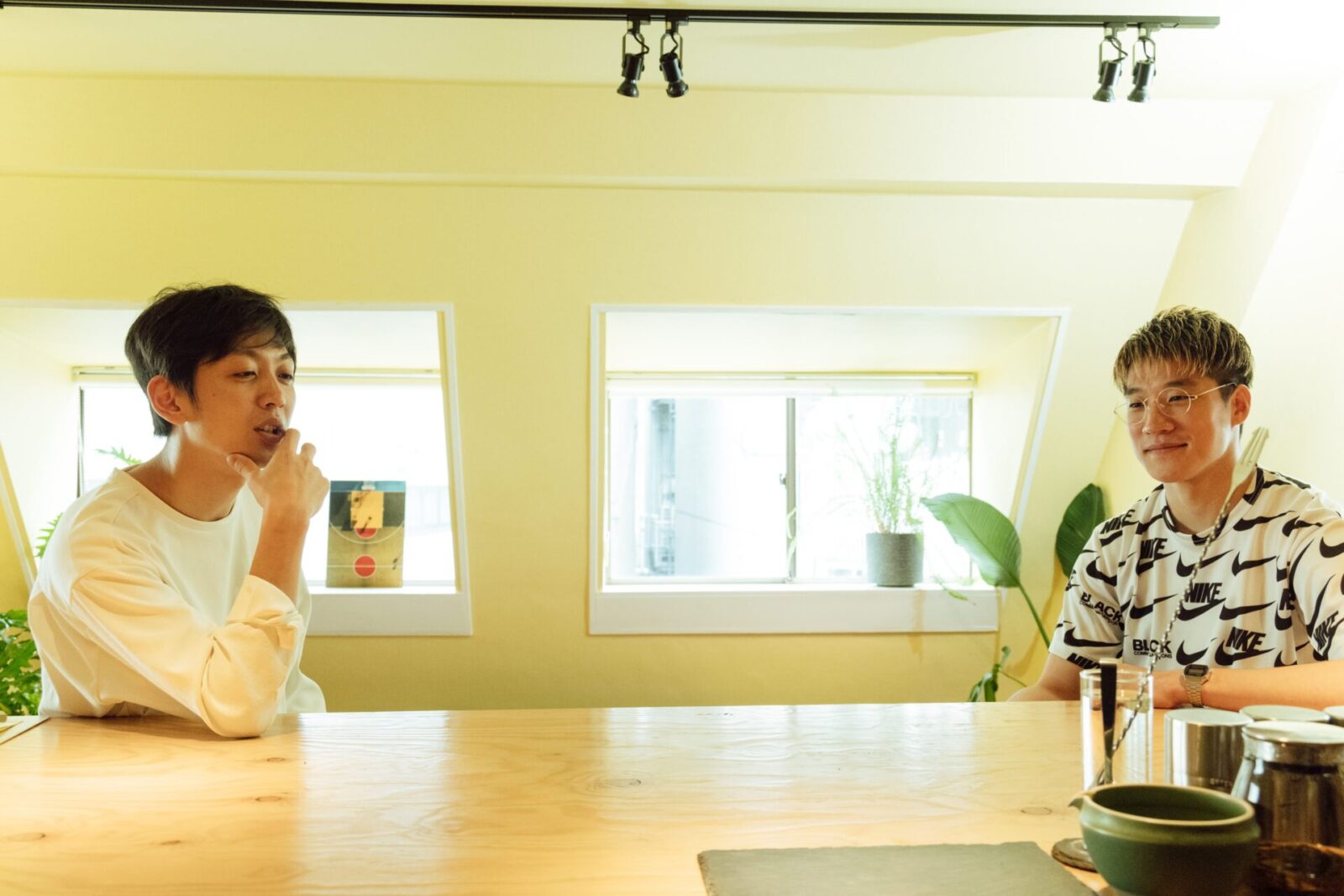
Yellow opened in February 2021, and the inside walls are all painted yellow. The color of the interior is from the original paint and our two guests today are co-owners and good friends. This article will share the story of how their lives intersected, their beginnings with shisha, their concept behind creating a “friend’s house” at Yellow, and their plans for the future.
With a pipe in one hand, we spoke to the key players of this new and upcoming shisha cafe.
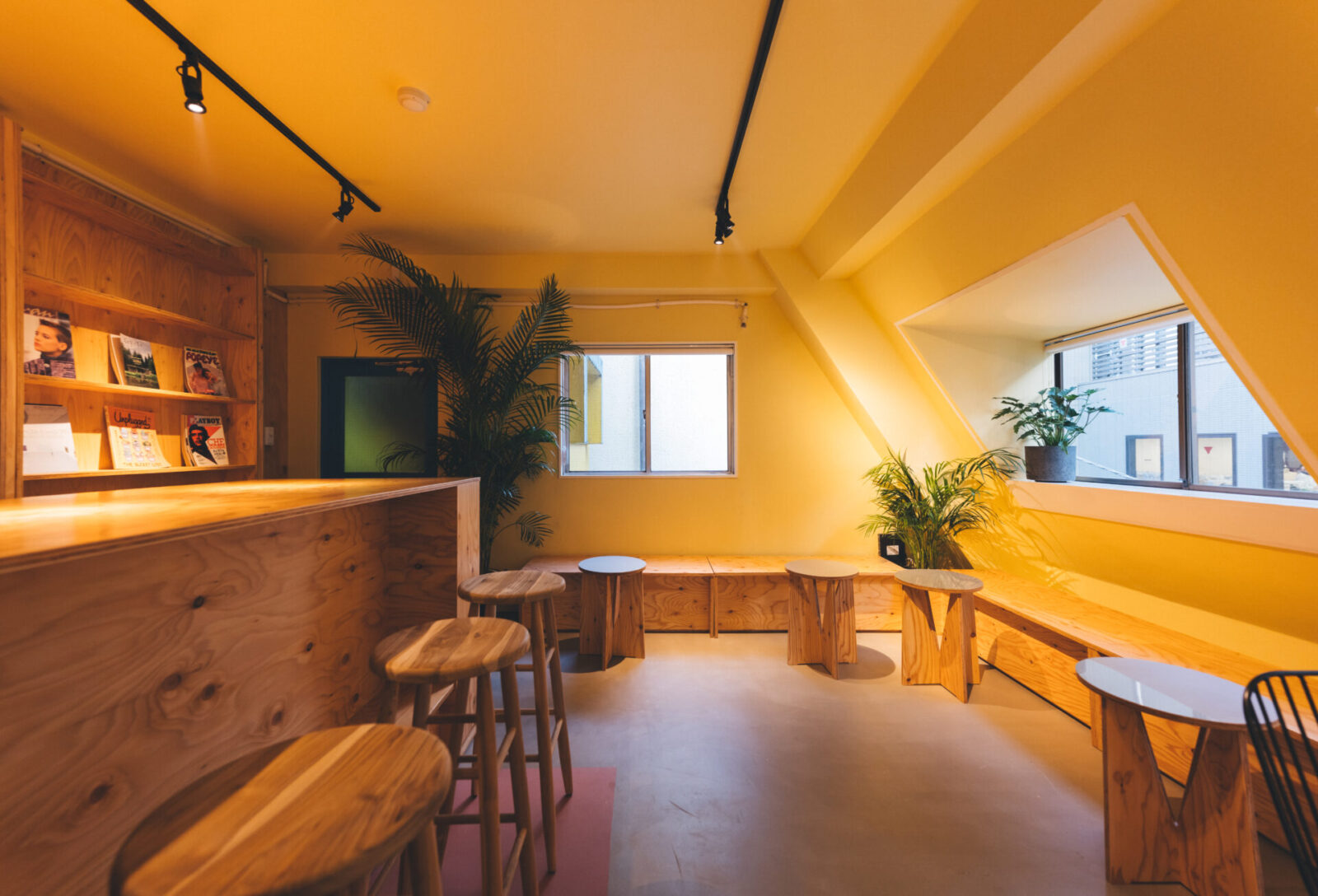
A Shisha shop that feels like a “friend’s house,” and the joy of connecting people
──When was the first time the two of you smoked shisha?
ENO:It was about eight years ago when I was in university. I went to a shisha shop in Shimokitazawa with a friend. However, it wasn’t until later that I began going regularly. It was after I graduated and started working as a photographer that I began going regularly with my friends.
──So your friends introduced you to shisha?
ENO:I would say so. The fact that I became good friends with the store owner also played a big part.
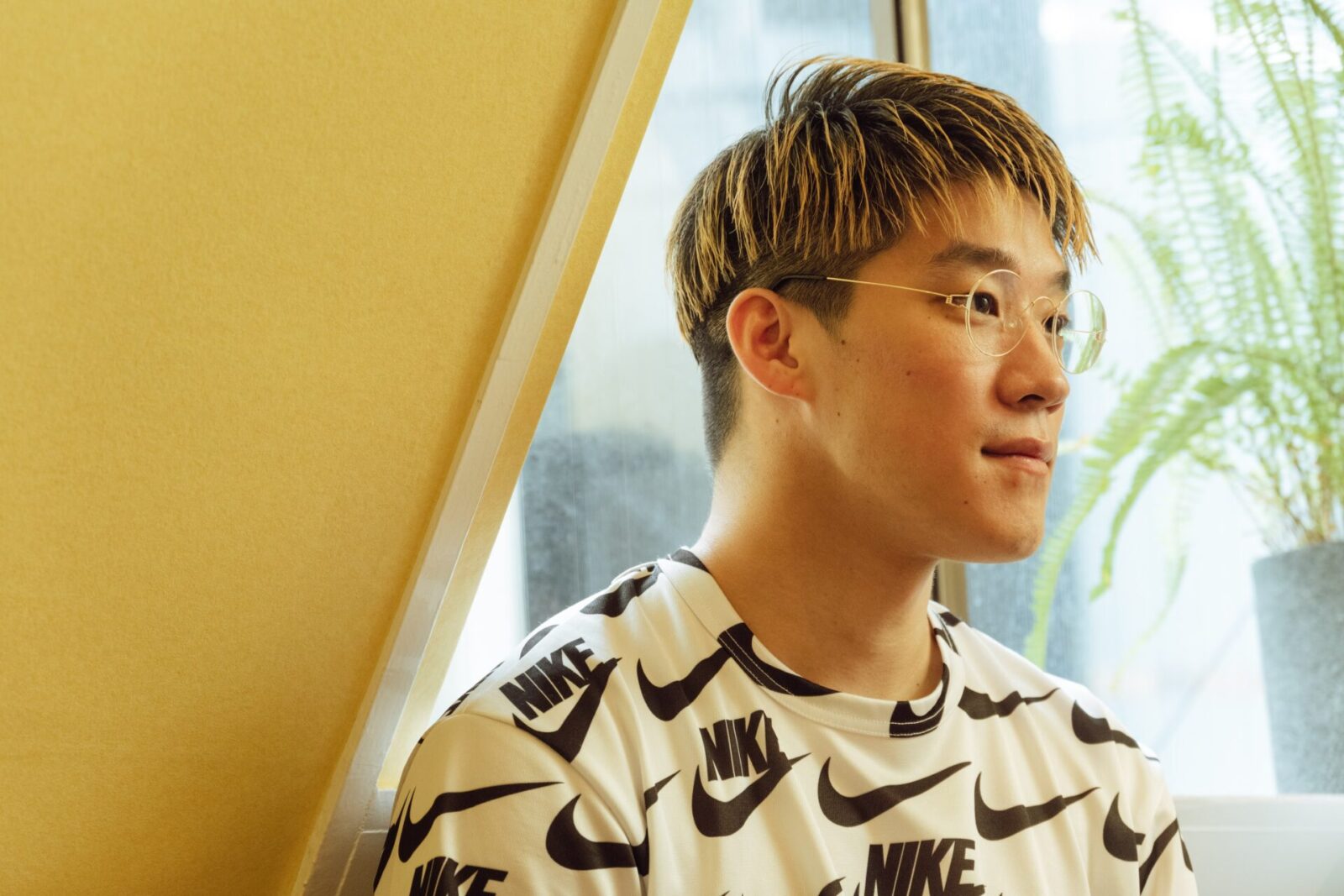
── So it was the people.
ENO: I think so. When you become close with someone, they share a lot of things with you so it’s really interesting. They teach you how to smoke or how to pack the shisha. It really felt like hanging out at a friend’s house.
I was usually working on my laptop, though. I would feel motivated to finish up my work real quick so I could reward myself with shisha.
Ishikawa: My first experience was at a store in Shibuya, but my honest first impression was that it was expensive. After that I didn’t smoke shisha at all. So ENO actually is the one who really got me into it. He would contact me and invite me to join him at the shisha shop so I would go. It was like going over to his place to hang out.
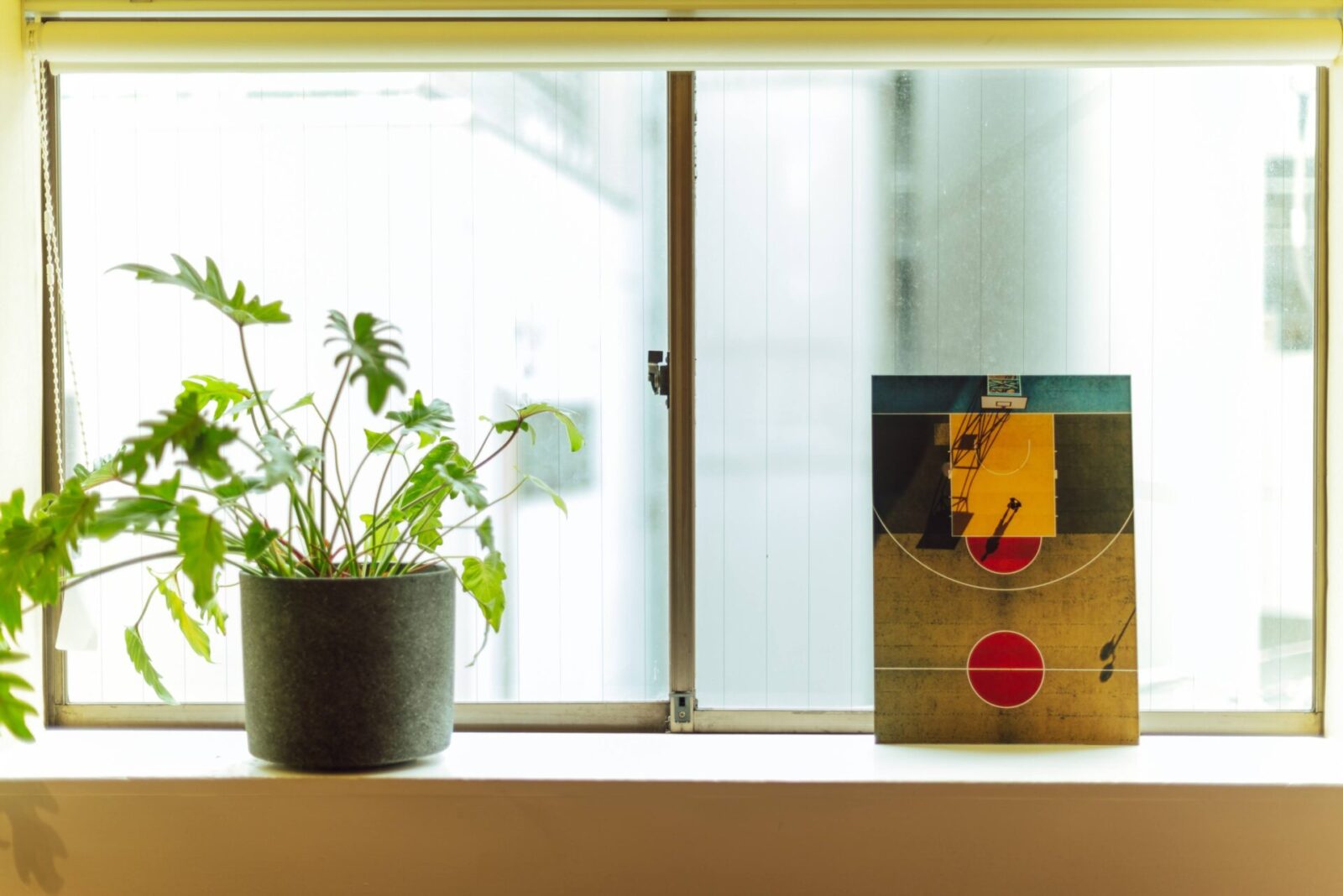
── So ENO was the person who introduced you to shisha.
ENO: For some reason shisha shops always have Wi-Fi and electrical outlets, which is really nice. It’s not common for people to go to shisha shops during the day, so it’s never crowded. With Wi-Fi, we can work and play games, read books and manga, and some places even have board games to play with.
Ishikawa: That’s true. As freelance workers, we don’t have an office, so the shisha shop was a place for us to gather with our friends.
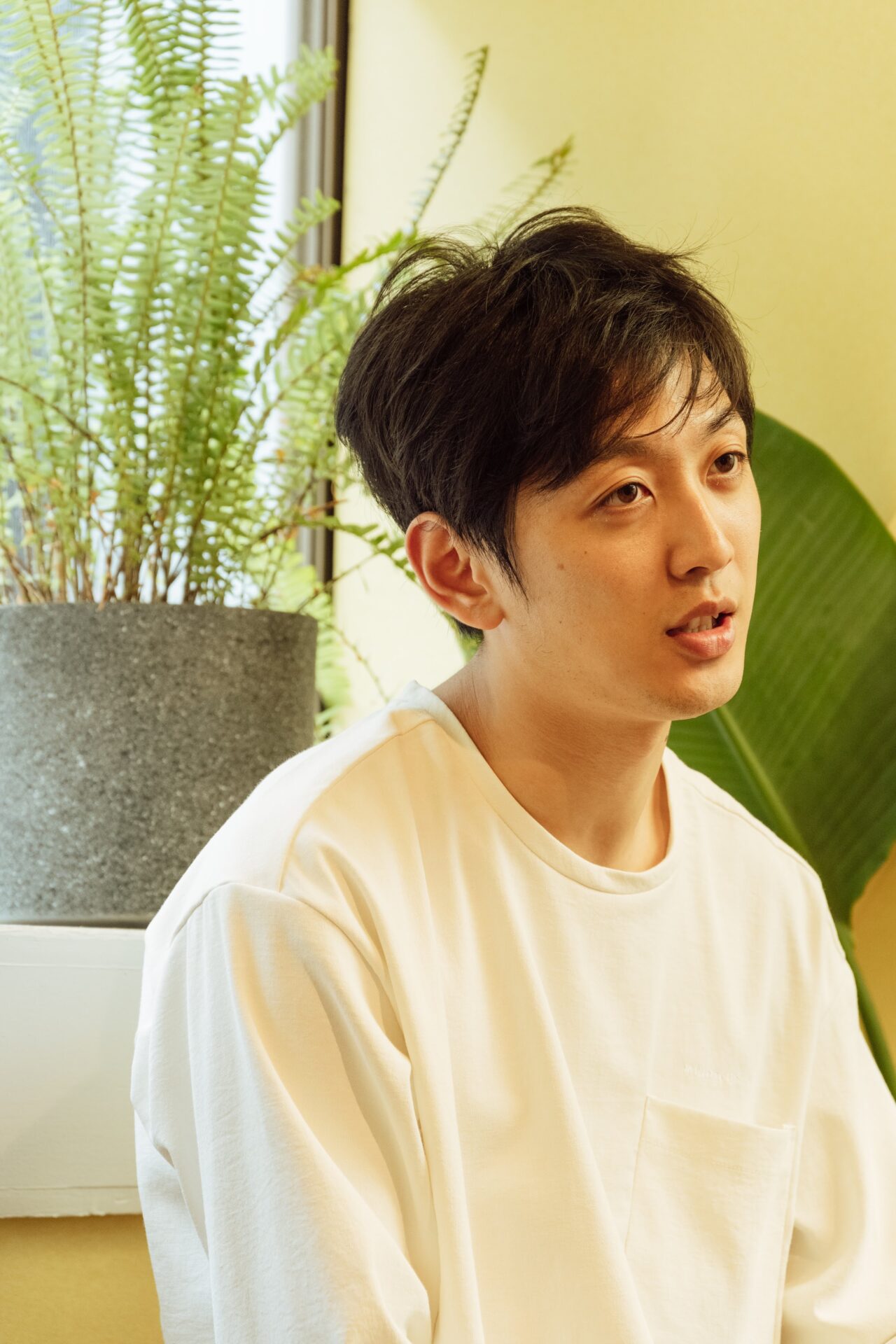
── When did you two first meet?
ENO: It was about seven years ago. I was meeting up with various people to celebrate my birthday.
── You planned those visits yourself?
ENO: Yes. I was with a friend until the afternoon, and called up the next person I wanted to see. That person was at Ishikawa’s house so I went over and met him for the first time. It was really a coincidence because my friend just happened to be at his house. We said a quick hi that day, and honestly the next day I didn’t remember much of the encounter.
── After such a meeting, you eventually decided to co-own a shop.
ENO: We never anticipated it. However, a few days later I went to an event and met Jo again. We spoke a bit more and found out we work in the same industry and have a lot of mutual friends and after that we started going out for drinks often. Since we both live in the Nakameguro area, we hung out often and these last two or three years we see eachother everyday.
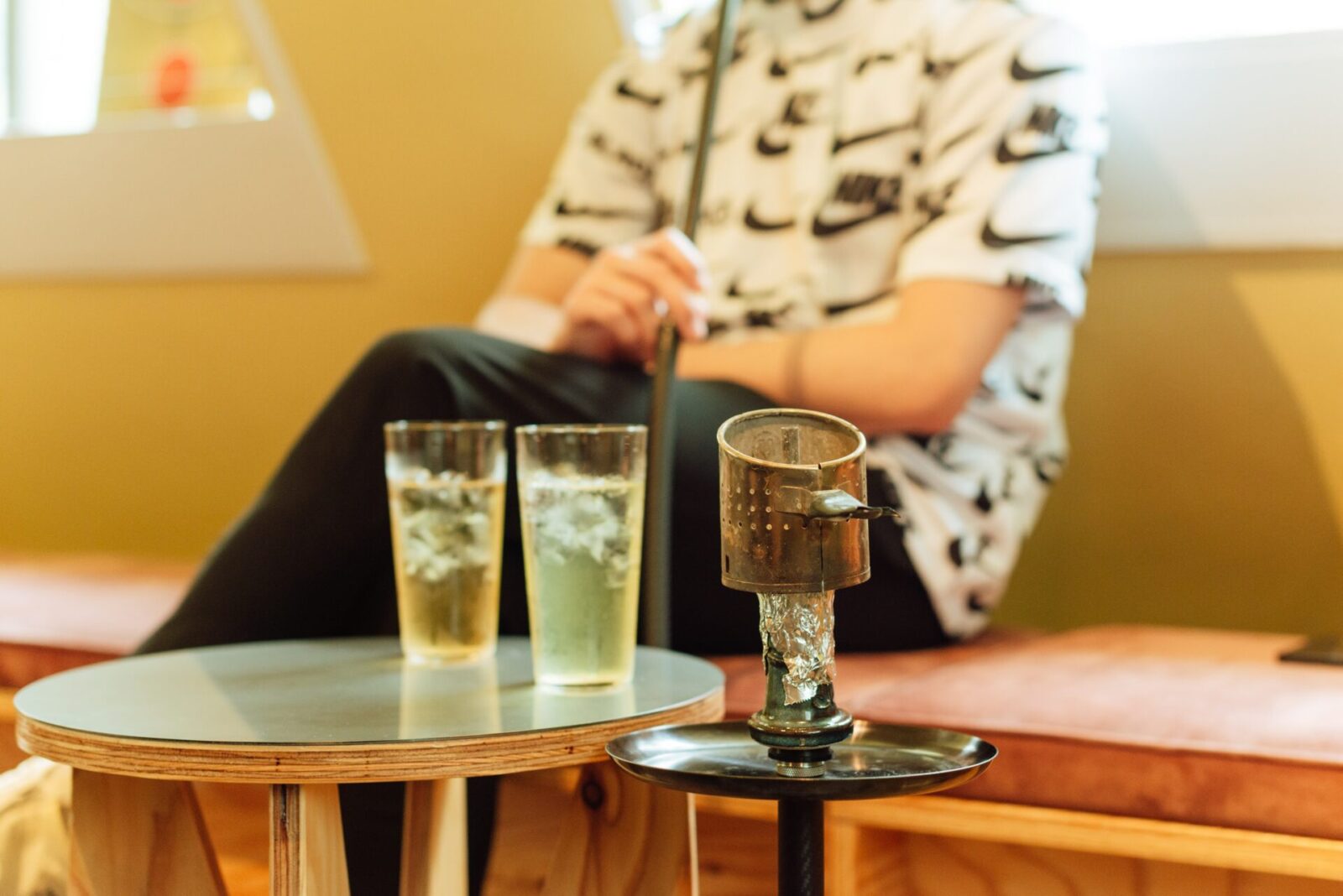
In its origins, Yellow was founded on fun
── Being friends and starting a business together are very different things though.
ENO: A while ago we were given the opportunity to open a shisha shop once a week in a place called Tsukanoma Food Court. It was really fun and a lot of our friends loved it.
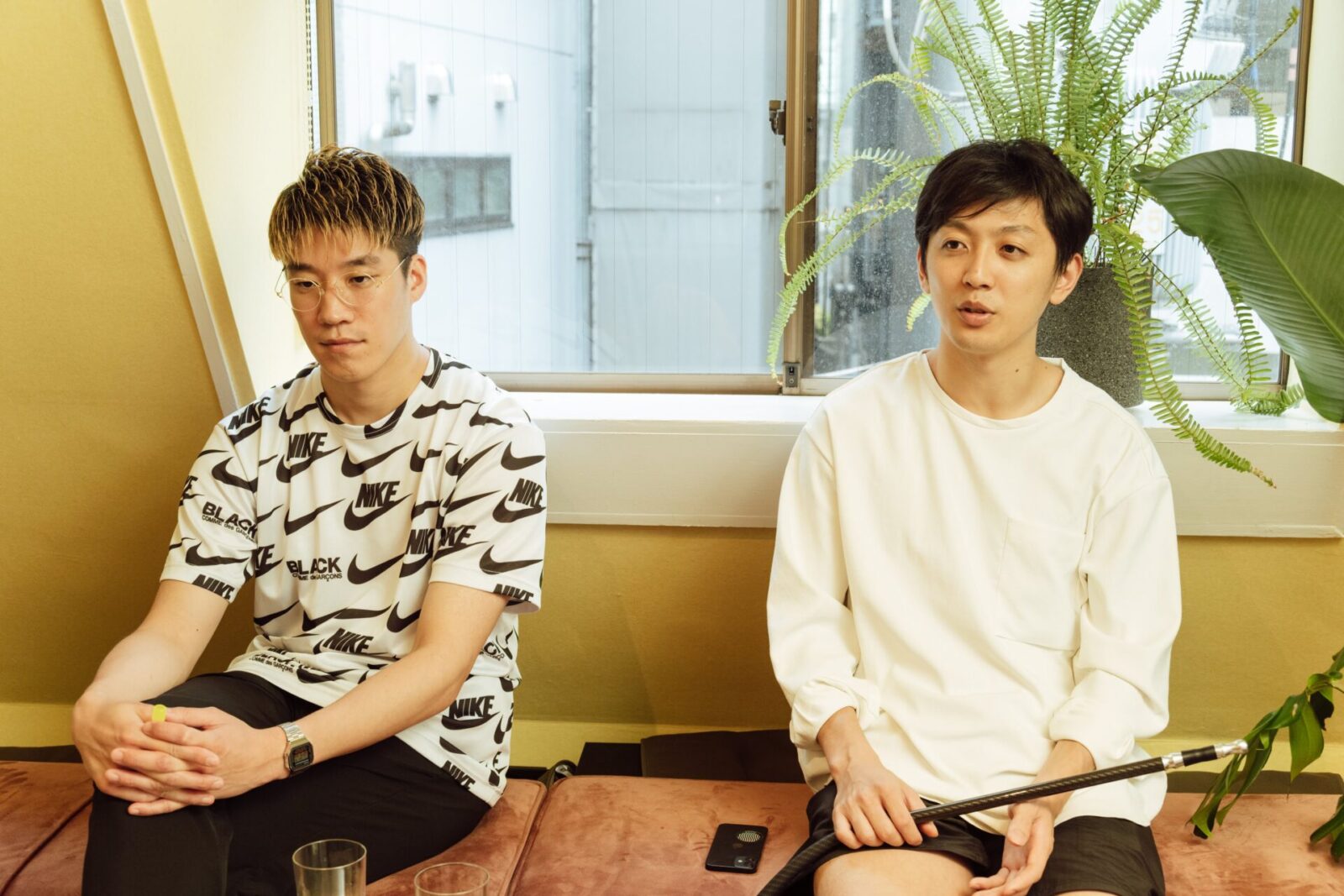
── You mean the shop in Shinsen that was open for a limited time from October 2019 to February 2020. It was run through the collaboration of a lot of people, mostly in the food industry.
Ishikawa: We happened to know one of the organizers of the Tsukanoma Food Court. We were told they found a nice venue and they asked us to do something fun there.
ENO: It was for a short time, but a lot of our friends came often.
Ishikawa: It was the first time that our separate groups of friends mingled. When going out to eat or something, usually you can only hang out with about five people, but when you have your own place, you can have a group of 10 people.
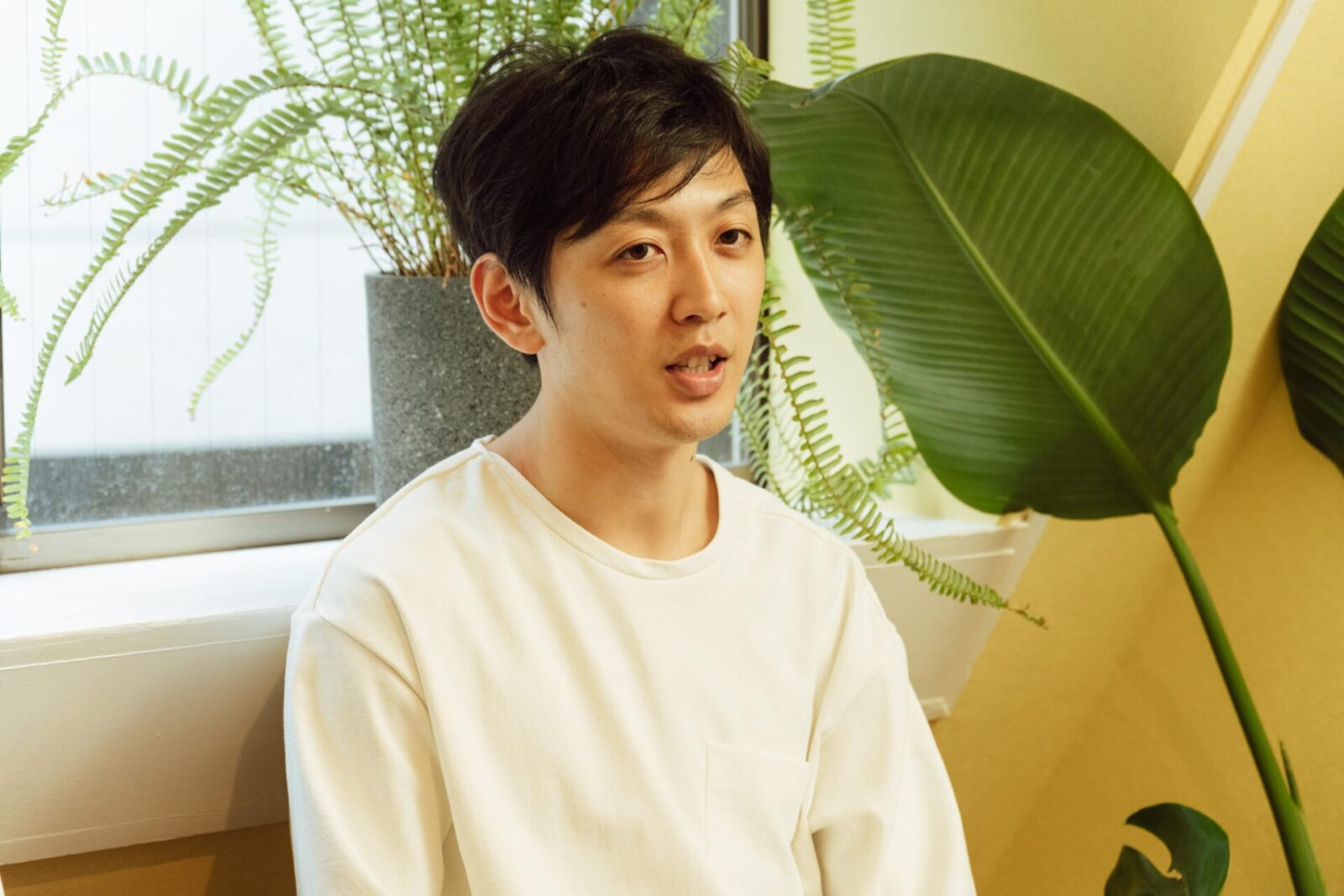
──It’s hard to have conversations when eating too.
Ishikawa: Our main goal at the time was to make a place for our group of friends to hang out. The reason we chose shisha was simply because I am into it. We really relied on Rei Tamura, our store manager at Yellow who is in charge of shisha, on the details.
ENO: A lot of our friends asked us to open another shisha shop, and because the Tsukanoma Food Court event helped bring our groups of friends together, we wanted to make another space where people can connect like that again.
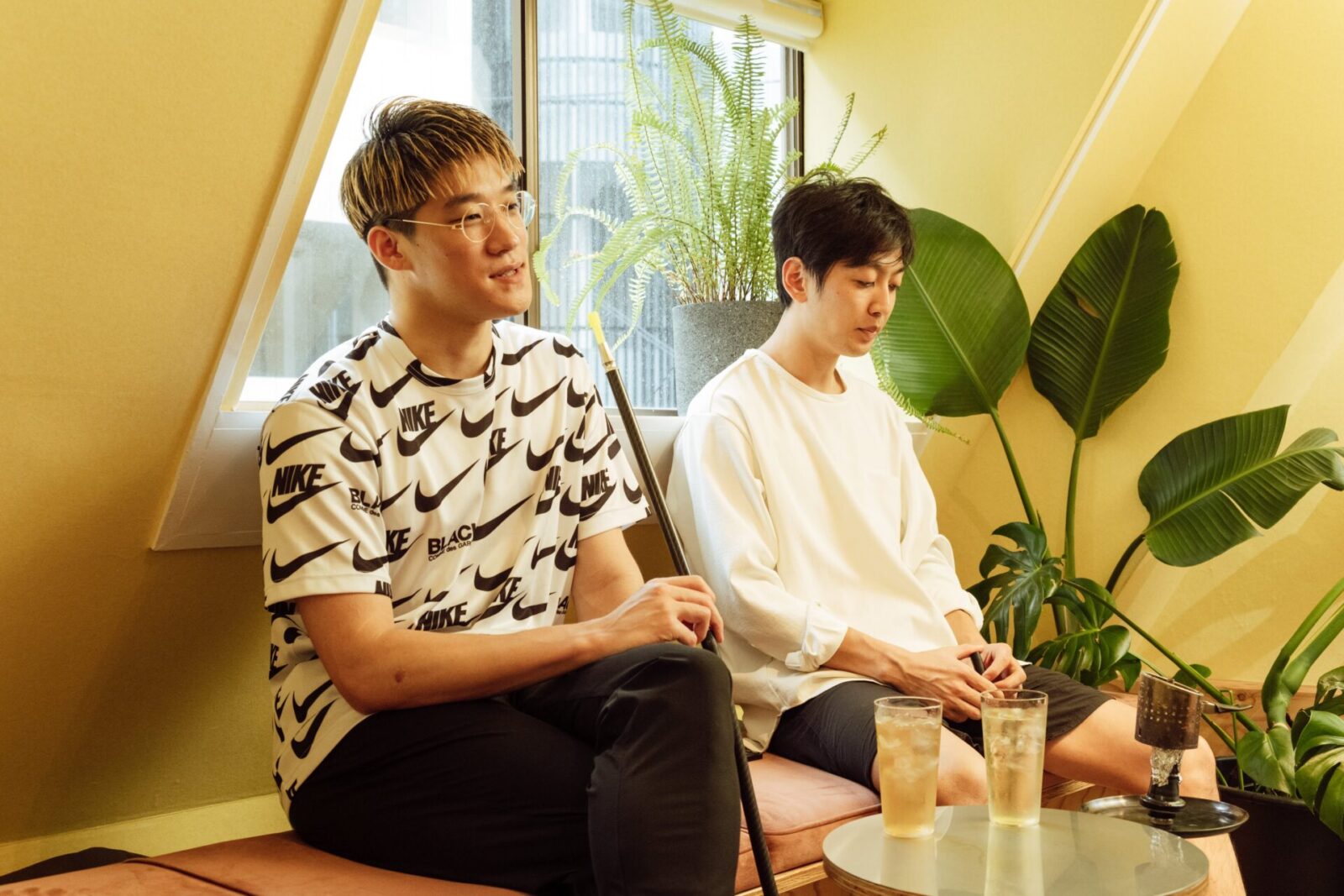
Ishikawa: With COVID, it was difficult to go to restaurants in general.
── It’s easier to go when you know the store or restaurant owner.
Ishikawa: Personally, I was thinking a lot about how to ride the current waves of change happening in the world. A lot of restaurants are closing down, but on the other hand, the rise of remote workers has brought about a big change in our lifestyles.
I thought that I can utilize my skills better working on my own rather than in a company, and I also wanted to try something new. When looking at properties, we found this nice place so we decided to give it a try.
── So the timing was good in terms of both societal and personal circumstances. By the way, your shop is in a building known as the “yellow building.” Did you choose to name the store Yellow because of that?
Ishikawa: Yes. We didn’t change the color of the walls either, so it is as it was before.
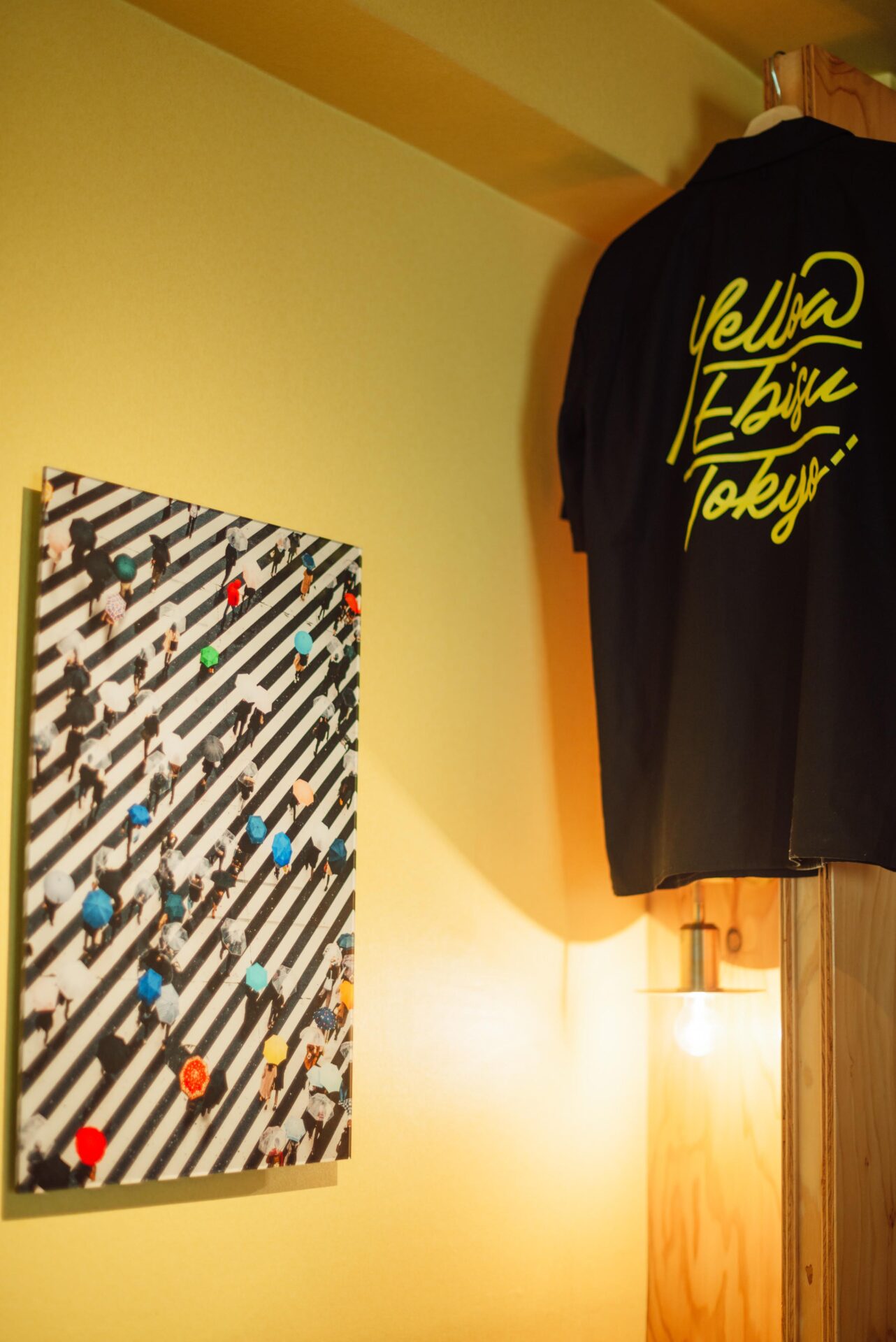
── It has been a little over half a year since you opened. How’s it going so far?
ENO: Compared to the Tsukanoma Food Court, more people that we don’t know come to the shop, so it’s interesting to see the community growing. However, I think because the ambiance of our store is unlike other shisha stores, the people who come tend to be people who are similar to us in age group and job fields. When we connect with someone on social media, we often find that we have several mutual friends. The age group is mostly in the late 20s and early 30s and we have a higher percentage of female customers.
Ishikawa: One thing that is certainly different from the Tsukanoma Food Court is that there is much more that we are able to do ourselves. We can design the space as we like and we can create the services that we want. There are a lot of people in Ebisu, so we think it’s important to show our originality.
When creating a place people can return to is the focus, cost is besides the point
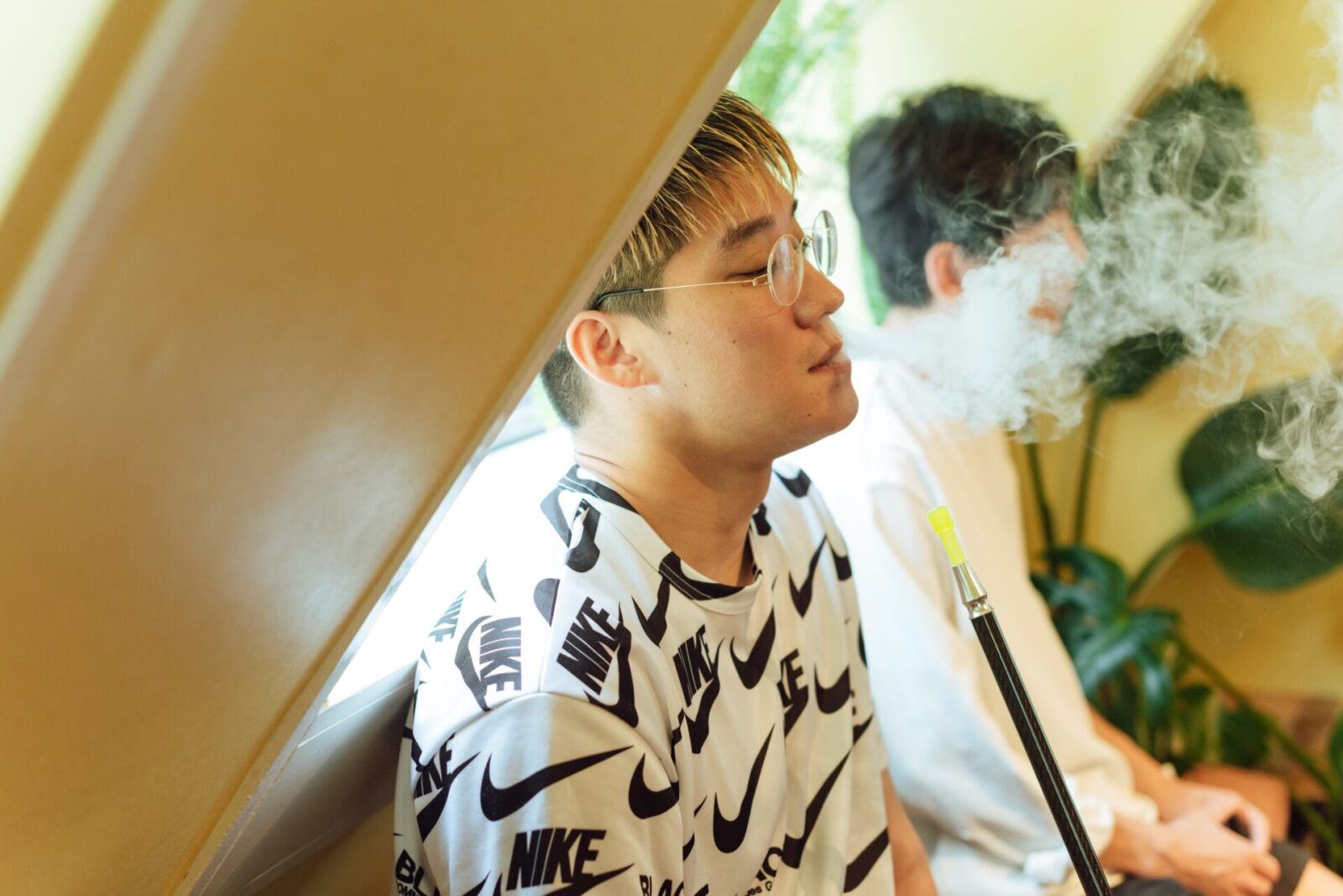
── How do your customers spend their time here?
ENO: I think most people come to relax. A lot of people come about twice a week.
── So you have regulars. Why do you think they became regulars to this new shop? I think it’s usually hard to obtain regular customers.
ENO: Perhaps the lighting here is nicer than most bars. It takes some courage to enter a dark lit bar by yourself. In that sense, it’s welcoming here for individuals.
Ishikawa: I think it’s simply because the shisha tastes good. We don’t care about the cost ratio of our product. It’s more important that we have more people coming back to our shop. We serve high quality drinks and what we offer at our shop is clearly different from other shops.

──So you prioritize getting customers to come back over cost ratio.
Ishikawa. That’s right. I think some shops focus on operation and lowering cost ratio, but we want to focus on good communication and providing quality services. When you serve your friends, you don’t think about the cost ratio.

── That makes a lot of sense.
Ishikawa: We want to serve things that we can say to our friends, “This really tastes great!” That is something that is very important to us. To run a shop I think it’s important to create comfortable communication and silently serve really great tasting products.
── I see.
Ishikawa: To be more specific, I think it’s really important that the customers see that we are doing something we really love. I prefer shops that have that kind of human touch over just fancy places.

Ishikawa: For a lot of people, their first experience of smoking shisha is here at Yellow and they fall in love with it. I think that is the most important value of having this shop. A lot of people initially come to the store for something other than shisha. For example, they hear that the matcha-hai cocktail is good, or that the new shop in Ebisu has nice vibes, or simply that Eno started a shop.
ENO: Our friends bring their friends.
Ishikawa: People in the shisha industry, like those Rei has connections with, seem interested in our shop because of the unique way we are gaining popularity. ENO and I are sharing the fun of shisha to people in our industry and that is creating a new culture in the existing shisha community. I think Yellow is in a nice position of being a kind of middle ground.
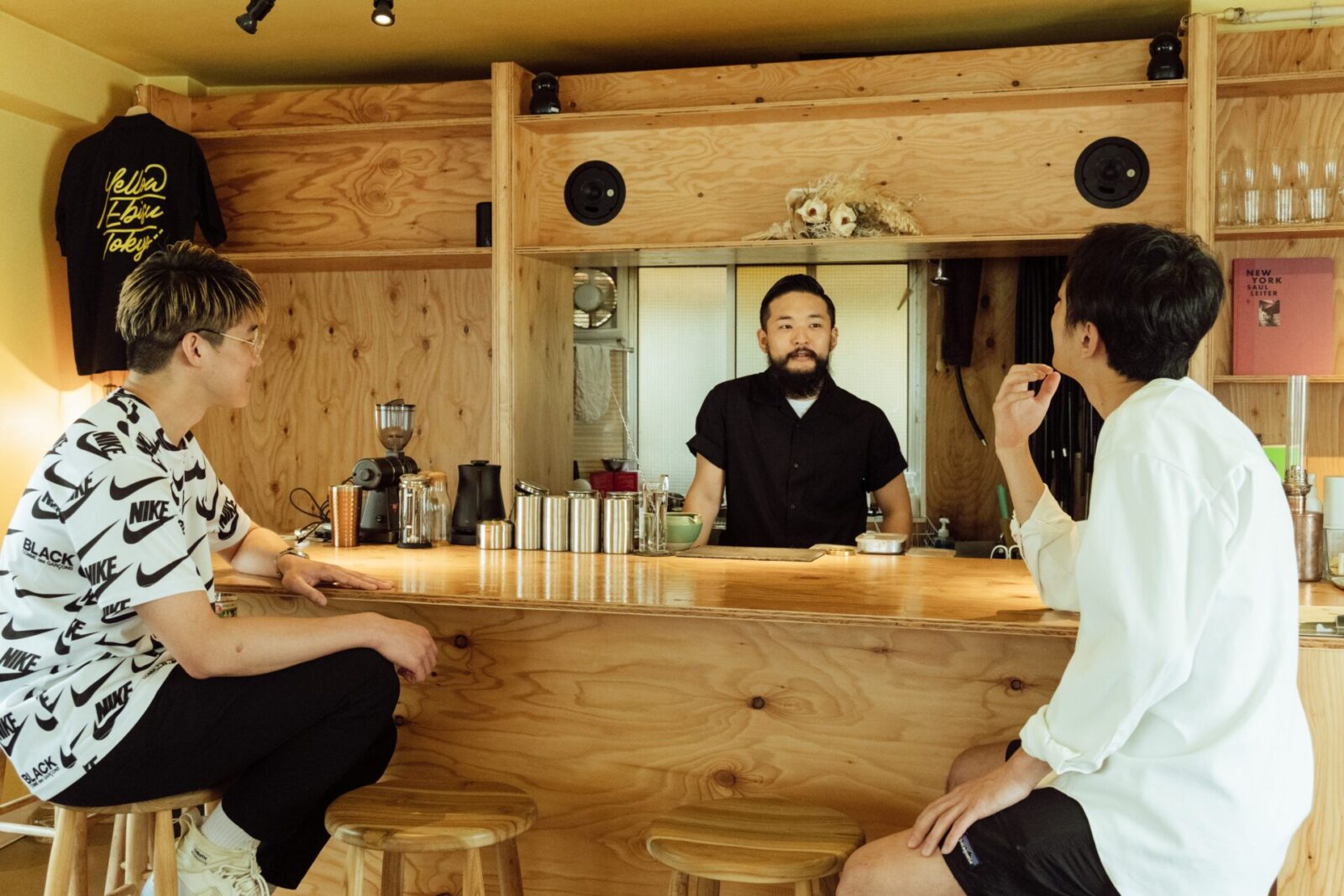
── Although it has only been six months, do you have any future plans?
Ishikawa: We often get asked if we will expand and make more shops, but unless we can be present at the shops, I don’t see much point to that.
── Because it is a “friend’s house”?
Ishikawa: Because we are not binded by anything, I believe we are able to approach shisha in a different way from others in the industry. For example, the shisha pipes we use are from Germany, and the reason we chose it was because the classic Middle Eastern shisha pipes did not match our taste. I think we are the first shop to use these German-made shisha pipes in Japan.
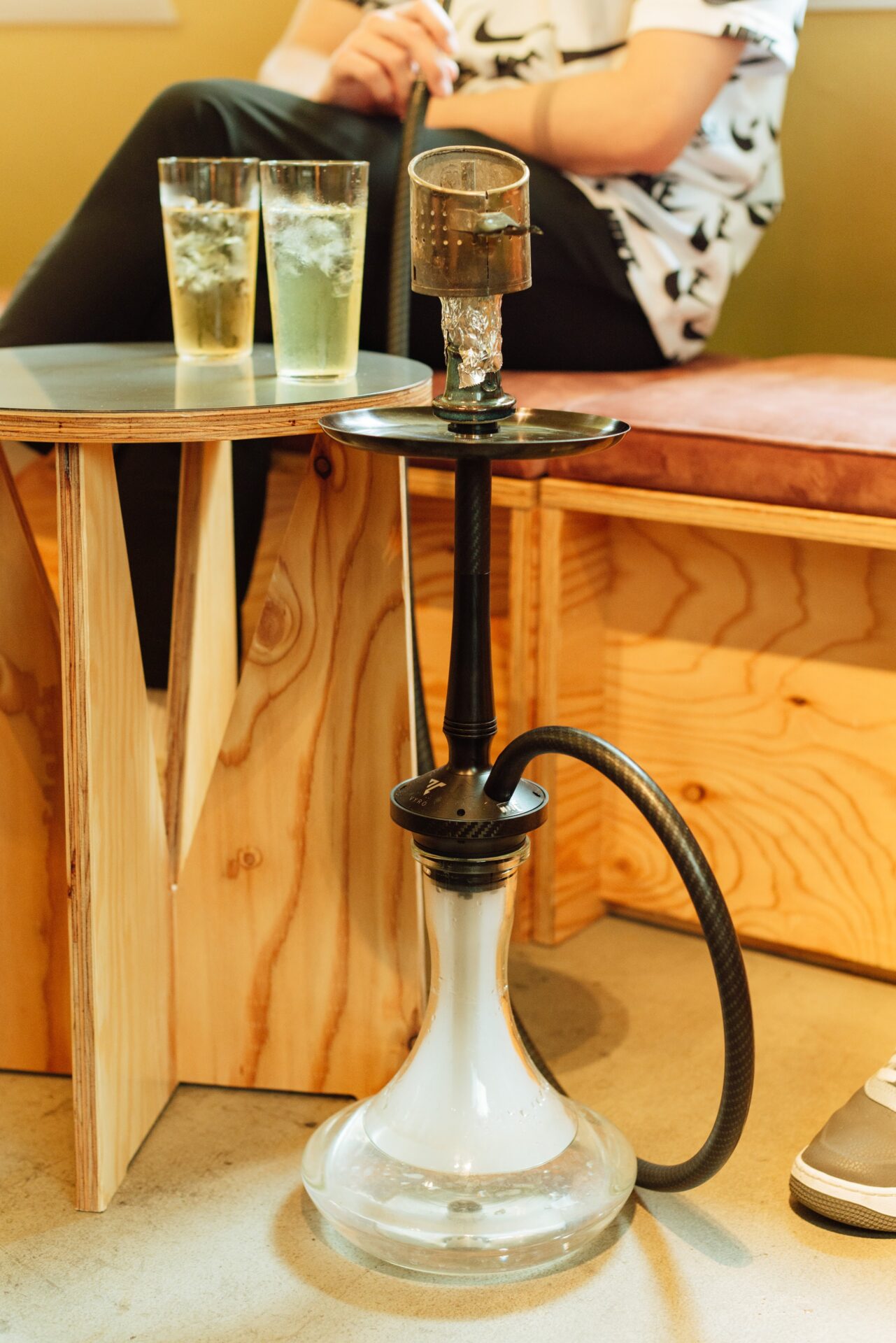
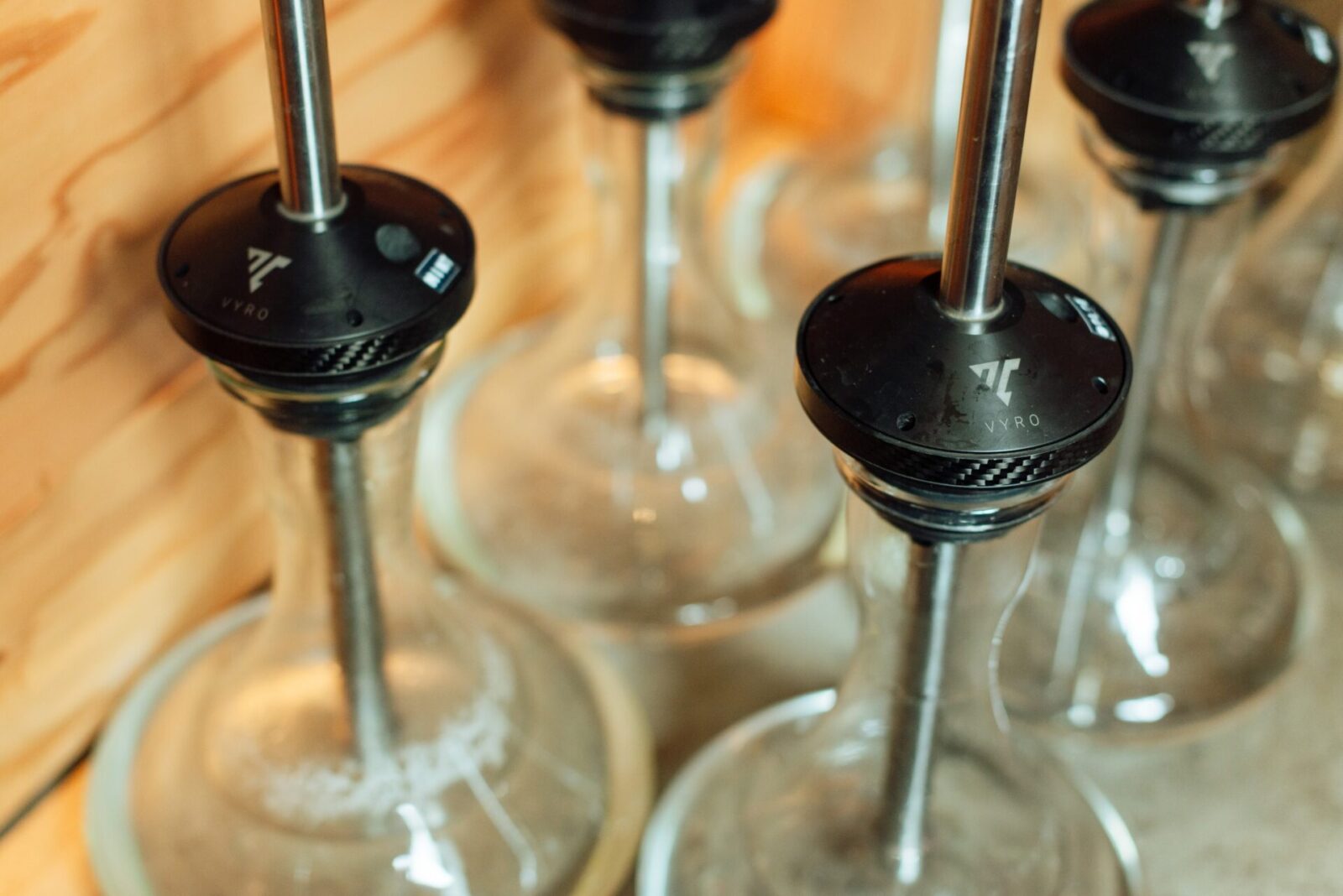
Ishikawa: We also create intense flavors. We are very careful to provide shisha with a strong taste so we chose flavors that provide that.
── Why do you want a strong flavor?
ENO: Would you go back to a bar that served you a watered down drink?
── That’s true. That’s very convincing.
ENO: Like Jo often says, we don’t base our service on profit, like how we talked about cost ratio. We really want to provide high quality stuff. I personally don’t enjoy going to shisha shops that have no flavor, or that lose flavor after one hour. No matter how nice the ambiance of the space is, there’s no point if the product is not good.
A shisha cafe with no shisha menu
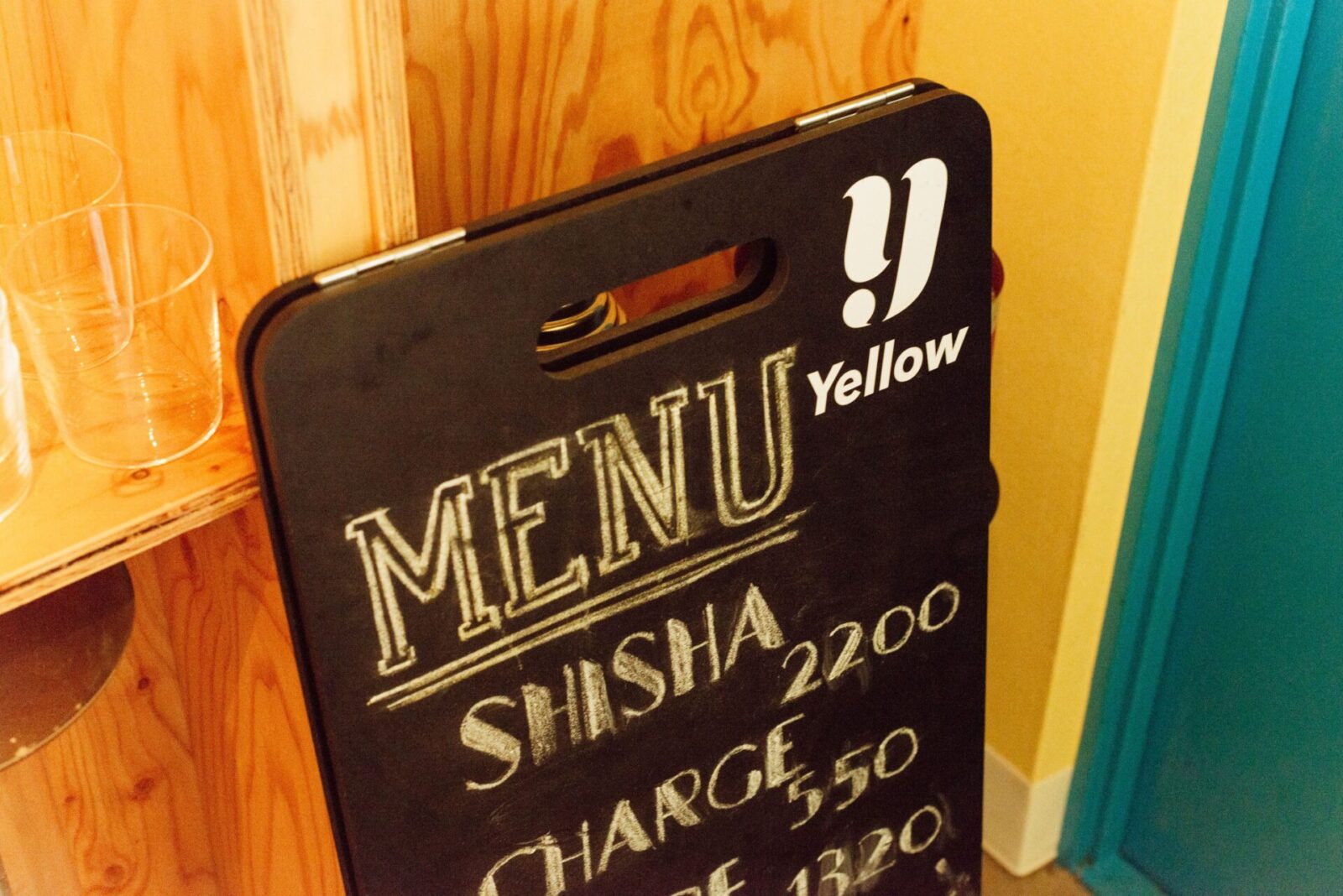
── Do you have a special menu that Yellow is known for?
Ishikawa: No, not really. We have choices for both first-timers and shisha enthusiasts though.
── I noticed you have a menu for drinks but not for shisha.
ENO: I like shops with no menus. I prefer to be served something that matches the mood of the day. It’s like asking a bartender to make you a drink based on what you ate earlier. Of course customers can make specific orders. They can ask for “apple and mint,” or ask for shisha without mint.
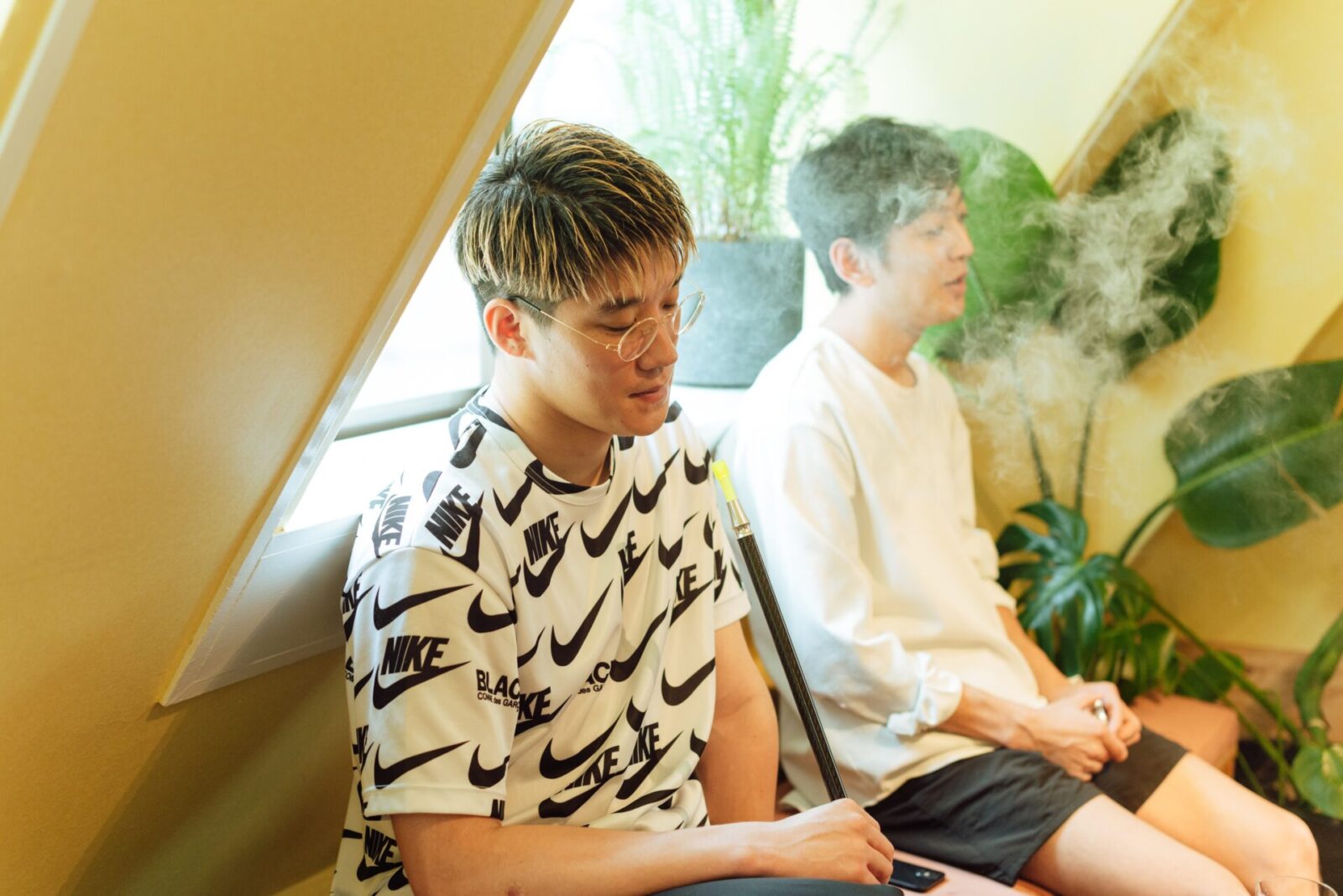
Ishikawa: We don’t really have a set style because we value communication and will match the customer’s needs. Again, it’s important to have people come back. We don’t stinge so we add lots of flavors and serve shisha with care. We check to make sure everyone’s coals are lit properly. We hope that the customer feels that our services are unlike other shops and it will encourage them to recommend it to their friends. I am always thinking about what we can do to better achieve that.
ENO: One thing we want to do in the future is open a temporary shop at a beach house.
Ishikawa: Yes, and we want to do things that will raise the prestige or change the stage for shisha. Shisha shops have an image of being an “underground” place, but I hope these perceptions change and it becomes a place to connect people. Increasing the number of shops only changes our sales, so I don’t feel the need for us to do that.
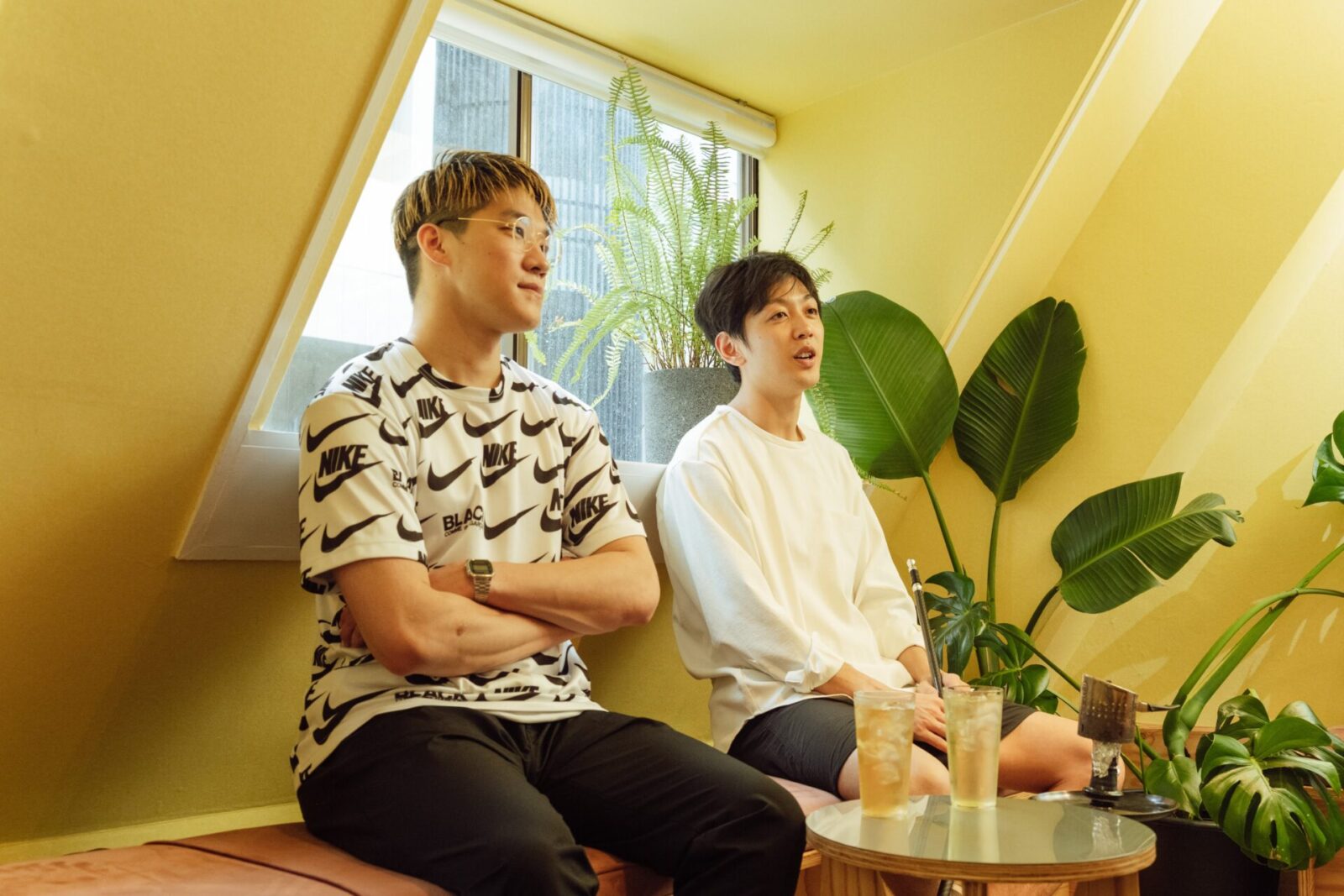
── How do you two share responsibilities?
ENO: Jo is better at producing, so I leave that to him. He sometimes asks me for creative advice, but Jo and I have similar taste so I tend to always agree with him. I am just here for the ride.
Ishikawa: Actually, even when I was running my company, I didn’t do a lot on my own. I like to think about what is happening in the world and what we can do in response to that. My number one joy is creating meaning to what we do. However, to realize something, you need the help of a lot of people. I think it’s really important that each person does what they are good at and then multiply it together.
── The attraction of Yellow’s space must be from the chemistry that comes from that multiplication.
Ishikawa: I think so. A shop is like a living thing so it needs to be kept in circulation. It’s not healthy to run things based solely on my personal network and values.
At your “friend’s house,” there’s no need to give way to anything
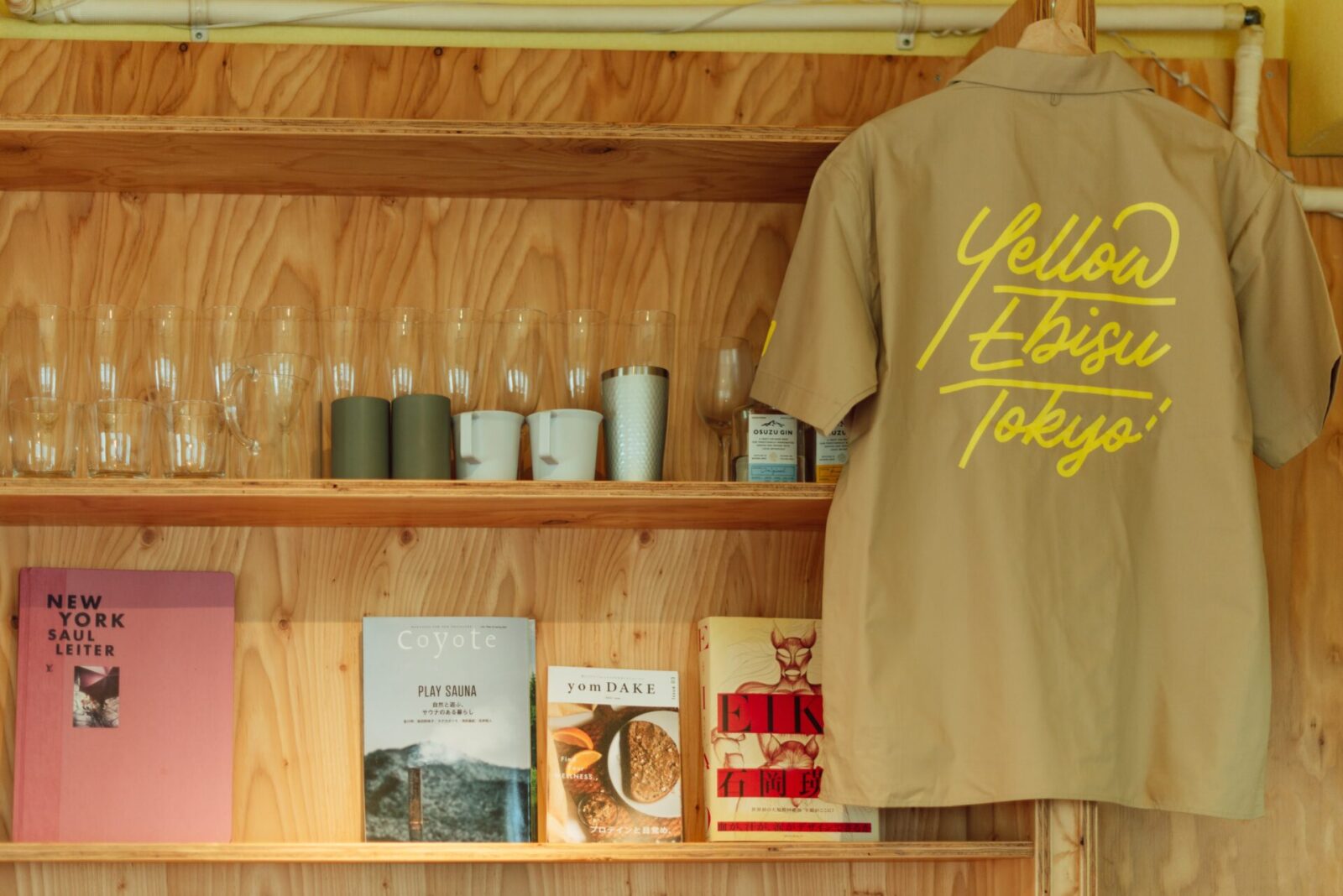
── The concept behind your shop is a “friend’s house.” How did you come up with this?
Ishikawa: Rather than creating a fancy shop, we wanted to create a casual space for friends to congregate. We didn’t want to create any borders between us and our customers.
There was some talk about how the dining table was too big, but we decided to keep it because we liked the presence and distance it created. As communication becomes deeper, there is more meaning to having this shop. I also want to keep the scale of the shop to a size where the staff members’ names are recognizable.
── It’s true that you can see everyone from the dining table. Of course Rei talks to the customers, but do you two as well?
ENO: I may say something like, “Hey, I saw you here the other day,” but I am not too assertive about it. Just enough to be friendly.
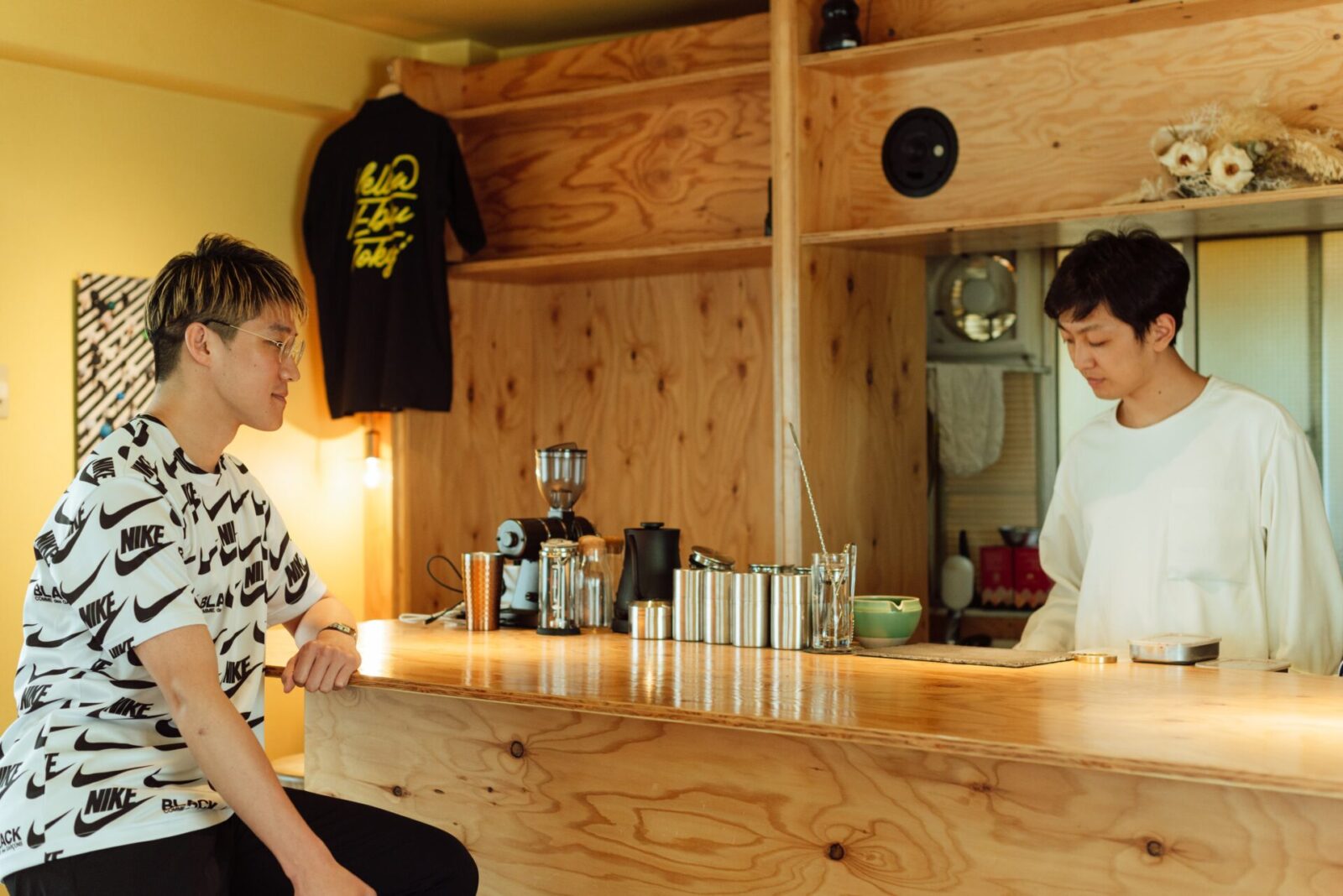
── With the casual way you are dressed, I doubt anyone coming here for the first time will think that you two are the owners of the shop.
Ishikawa: That’s true, but that level of comfort is probably just right.
ENO: I enjoy thinking about how fun it would be if certain people connected. So when someone tells me what they are interested in, I like to introduce them to a friend who may be able to help them, for example a designer. I have always enjoyed meeting people so the only time I spend alone is when I am asleep. It’s not a struggle for me to communicate with people.
Ishikawa: On the other hand, I am not really a person that goes out of one’s way to meet people.
── What do you mean?
Ishikawa: I was an only child, and from a young age I was always online so I sometimes want to be alone. I actually don’t really like going out and having to talk to a lot of people, so it suits me to have my own shop.
I am very aware of the fact that I need the help of other people to realize my goals, but on one hand a part of me kind of resents it. Of course I know it’s impossible to do things alone, and I understand the fun of doing things with others.
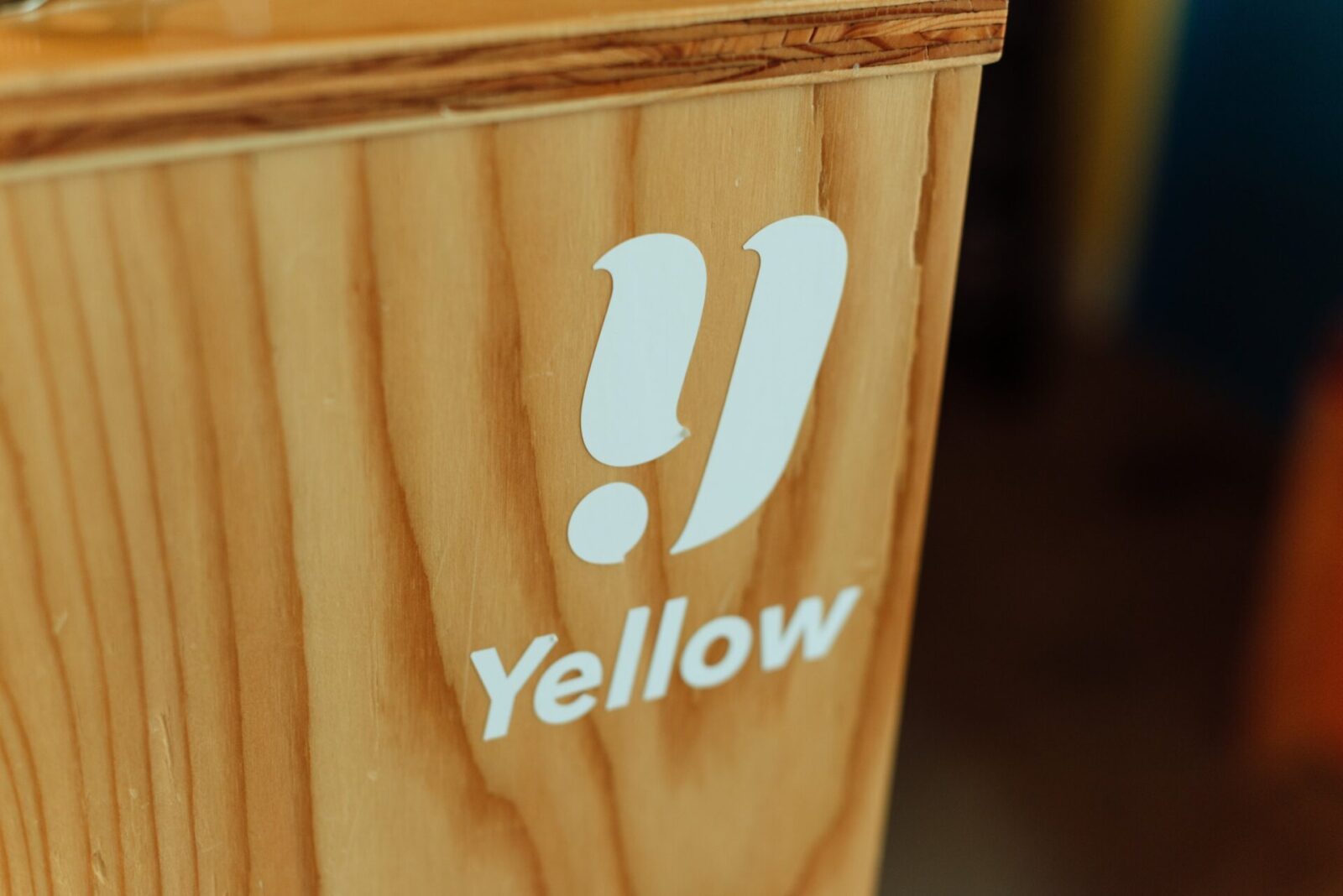
── It’s interesting how you two are saying the opposite things.
ENO: That’s true.
Ishikawa: That’s probably why it works for us.
── This shop is an open space, but do you think of it as a place that you three, including Rei, share as friends and others come to play?
Ishikawa: I think so. I think it’s important that we don’t suck up to anyone. That’s true for all three of us. We don’t need to flatter anyone and we don’t need to give into anything. In a good sense, this space is your “friend’s house” and not just for the three of us. That’s why we want to take good care of the people who come to the shop and are present.
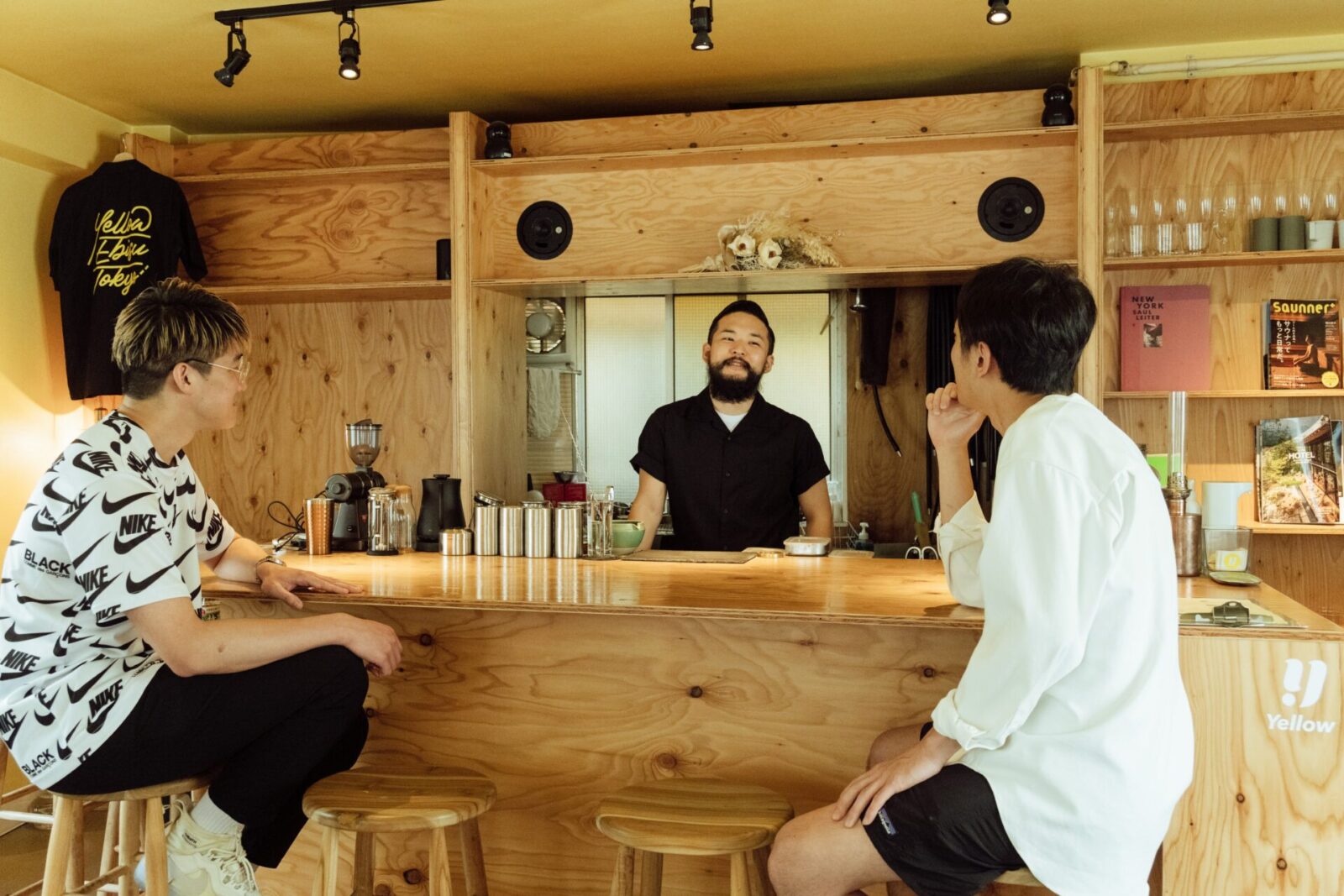
Photo: Madoka Shibazaki
Translation: Sophia Swanson
From Fukuoka. Traveled around Japan on bicycle after graduating university and began freelance work at the same time.
Written for multiple media while on the road, traveling over 5000 km. Continues to write and edit today as well as occasional filming.
Favorite soccer team is Liverpool FC. YNWA.
Editor and creator of the future through words. Former associate editor of Huffington Post Japan. Became independent after working for a publishing company and overseas news media. Assists in communications for corporates and various projects. Born in Gifu, loves cats.
